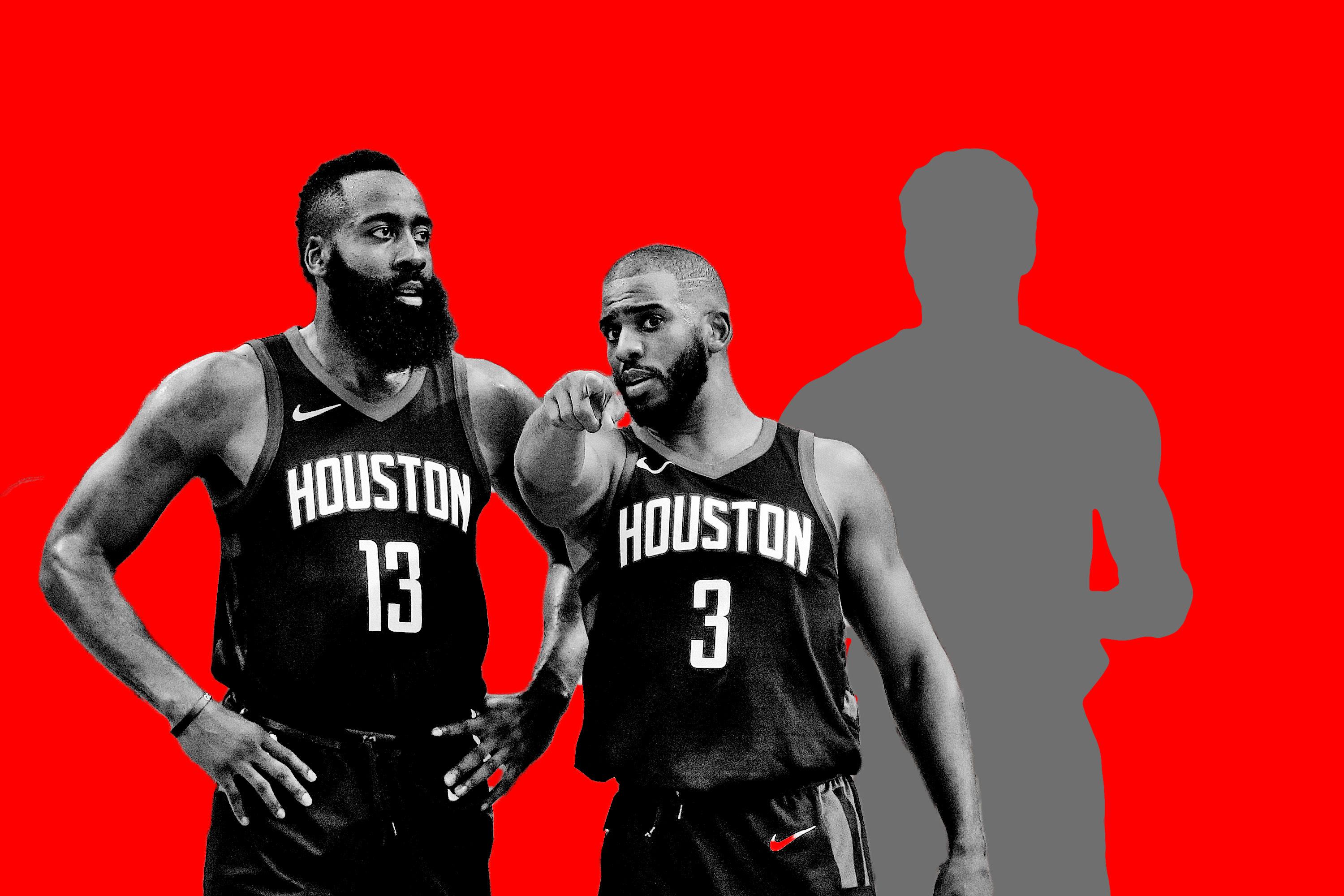
The Rockets look like themselves again. Their miserable start to the season is ancient history after their 106–87 demolition of the Warriors on Thursday pushed their record back to .500. They are now 3–1 since exiling Carmelo Anthony, but he was a symptom of a bigger problem, not the cause. Houston tried and failed to diversify its relatively simplistic formula from last season. The Rockets know they can win by slowing the pace to a crawl, spreading the floor for James Harden and Chris Paul, and grinding out possessions on defense. The question is whether they can keep it up for nine months.
The Rockets came agonizingly close to knocking off the Warriors last season, taking them to Game 7 of the Western Conference finals despite losing Paul to a strained hamstring at the end of Game 5. However, after signing Paul and Clint Capela to extensions worth a combined $250 million, they didn’t have the money to also pay Trevor Ariza and Luc Richard Mbah a Moute, whose ability to shoot 3s and defend multiple positions at a high level was crucial to their success. Houston tried to replace its 3-and-D specialists with a low-cost flyer in James Ennis III, while rounding out the rotation with guys like Carmelo and Michael Carter-Williams, who wouldn’t have to depend on Harden and Paul to create shots for them.
Paul’s injury last season may not have been just bad luck. Harden and Paul have to shoulder a massive offensive burden in Houston. Its system is based on the two guards taking turns dominating the ball for all 48 minutes and creating efficient shots not only for themselves, but everyone else in the rotation. The difference is that Harden is built like a tank (6-foot-5 and 220 pounds) and is in the prime of his career, and Paul is an undersized guard (6 feet and 175 pounds) in his 30s who depends more on guile than speed and athleticism. Houston wanted to add players who could keep Paul fresh for May and June.
The plan fizzled before it ever had a chance to get going. The Rockets were hit with a perfect storm over the last month. Paul was suspended for two games for his part in an on-court brawl with Rajon Rondo, while Harden and Ennis each missed three games with strained hamstrings. Eric Gordon, their sixth man and most explosive scorer outside of Harden and Paul, couldn’t handle the additional offensive responsibility in their absence and struggled through one of the worst shooting slumps of his career. However, even in a best-case scenario, Carmelo and Carter-Williams wouldn’t have been the answer. The cure they represented was worse than the disease.
Carmelo, never a well-rounded player even in his prime, hasn’t been able to adjust his game to his declining athleticism. The 34-year-old can no longer beat defenders off the dribble, but he’s not reliable enough as a spot-up shooter or ball mover to be effective in a smaller role on offense, and his poor defense makes him almost unplayable. The defensive scheme in Houston, which relies on switching every screen and having all five players moving on a string, certainly didn’t help. Coach Mike D’Antoni even considered scrapping the scheme in late October. The Rockets’ defensive rating this season drops from 111.0 in 294 minutes with Carmelo all the way to 102.7 in 378 minutes without him.
For as bad as Carmelo was, though, Carter-Williams was somehow even worse. Defenses didn’t even pretend to guard MCW, one of the worst shooters in the NBA, at the 3-point line. He was left so wide open that the ball often wound up in his hands, giving him far too many opportunities to create for himself. MCW had the highest usage rating (20.6) of anyone in Houston’s rotation other than Harden, Paul, and Gordon. The problem, as it has been throughout his career, is that he’s just not a good enough scorer to justify that type of role. The Rockets’ offensive rating this season shoots up from 95.6 in 100 minutes with Carter-Williams to 107.7 in 572 minutes without him.
D’Antoni has never liked going deep into his bench. Even at the height of the Seven Seconds or Less era in Phoenix, he still didn’t play more than seven or eight players. The early struggles of Carmelo and Carter-Williams only confirmed something he already believed. After a disastrous 98–80 loss in Carmelo’s return to Oklahoma City last week, D’Antoni circled the wagons, cutting his rotation to eight players and forgetting any idea of diversifying the offense. The Rockets, like a band who tried and failed to change their signature sound, went back to playing the hits.
One of the keys to Houston’s turnaround has been a few younger players who have thrived in more limited roles around Harden and Paul. Ennis, a 28-year-old journeyman on his fifth team in five seasons, has fit comfortably into Ariza’s former role. At 6-foot-7 and 210 pounds, he has the size and speed to match up with players at multiple positions, and he can knock down enough 3s (he’s shooting 39.5 percent on 3.9 attempts per game this season) to keep the defense honest. The whole point of paying Paul and Harden a combined $66 million this season is their ability to lift the games of guys like Ennis.
All of the pieces in Houston now fit together. Harden and Paul take turns running pick-and-rolls with Capela, while Ennis and P.J. Tucker spread the floor and take the toughest assignments on defense. Gordon brings scoring punch off the bench, with Gary Clark, an undrafted free agent on a two-way contract, and Isaiah Hartenstein, the no. 43 overall pick in the 2017 draft, filling out the rotation. Clark and Hartenstein, like Ennis, know exactly what is asked of them on both ends of the floor. Clark, who will likely have his contract converted, is a tough defender who can hit spot-up 3s, and Hartenstein has done just enough in his nine minutes per game as a backup center to keep Capela fresh.
It shouldn’t take long for the Rockets, who are in a four-way tie for the no. 9 seed in the Western Conference, to climb up the standings. They have a net rating of plus-9.5 in the four games since they bottomed out against the Thunder, and none of the teams ahead of them have separated themselves from the pack chasing the Warriors. And there’s no way to know what will happen in Golden State, which is dealing with more drama than ever. If Steph Curry has another untimely injury in the playoffs, Houston could be the favorite to make the NBA Finals.
There’s just one dark cloud in the Rockets’ suddenly bright forecast. It’s not even Thanksgiving, and they are leaning on Paul more than ever. He’s averaging more minutes (34.6) and shots per game (14.2) than last season, and his usage rate (24.0) is only half a percentage point lower. The hope was that the Rockets could keep Paul in neutral for most of the regular season and ramp him up in the playoffs. Instead, they may have to run him into the ground just to get themselves back to where they were last season. Even beating the Warriors won’t be enough to win a title. The Eastern Conference is tougher than it has been in a long time.
There was some logic to bringing in Carmelo. Houston could use a bigger forward to create shots for Harden and Paul, which would make their lives easier not only in the regular season but when they face elite defenses in the playoffs. The Rockets don’t have anyone who can screen for Harden and Paul and then score over a smaller defender on a switch. The only shot creators on their roster are under 6-foot-5. The missing piece is a forward who can create his own shot and make plays for others, while also spreading the floor for Harden and Paul and fitting into their defensive scheme. Olympic Melo might have been that person, but he’s a theoretical construct, not an actual basketball player. There’s a reason Houston reportedly offered four future first-round picks for Jimmy Butler.
While players like Butler don’t become available on the trade market often, there is one potential candidate who stands out. The Wizards have been a disaster this season, and Otto Porter Jr., who is averaging only 23.6 minutes over the past four games, has fallen out of favor with head coach Scott Brooks. At 6-foot-8 and 200 pounds, Porter is a versatile defender and a proven shooter with a career 40.3 shooting percentage from 3 on 3.1 attempts per game. He’s a smart and unselfish player who could reveal some untapped offensive potential in a new situation. He has played with nonshooters at point guard (John Wall) and center his entire career. Porter doesn’t have an elite first step, so he could benefit from all the extra space in Houston.
Something has to give for the Wizards, who have been one of the most underachieving teams in the league over the past few seasons. Porter is the obvious candidate to leave. They don’t want to move Bradley Beal, and there may not be any takers for Wall’s gargantuan $170 million extension, which doesn’t kick in until next season. No owner wants to go deep into the luxury tax for a bad team, and Porter is owed $82 million over the next three seasons. It’s too much money for an underused player. The Rockets could give Washington Ennis, who would fill Porter’s role at a slim fraction of the cost; Brandon Knight, Marquese Chriss, and Nene to match salaries; and some combination of future picks. That offer would save Washington so much money over the next few years that it would have to at least think about it.
Houston doesn’t have to make a move. It can hope to be healthy enough in June to take advantage of any drama or injuries in Golden State. It’s hard to see the franchise standing pat, though. Rockets GM Daryl Morey is one of the most aggressive executives in the NBA, and the window to win while paying Paul $40 million a season will close soon. Carmelo was a low-risk gamble that didn’t pay off, but that doesn’t mean that Morey shouldn’t try again. The Rockets have the pieces to be right there with the Warriors. They need one more to push them over the top.

